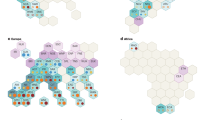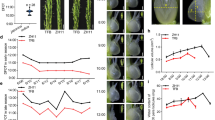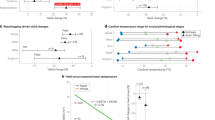Abstract
THE hydrolysis of food reserves in seeds (usually fats, starch and protein) is closely linked to embryo growth since it does not begin until germination has started. The control of food mobilisation by the embryo is best understood in cereals such as barley and wheat. In these cases the hormone gibberellin, moving from the embryo, activates the aleurone layer to produce an array of hydrolytic enzymes, including α-amylase, protease and β-1,3-glucanase and to secrete them into the endosperm where stored materials are located1. The stored food is of course laid down in the grain during its development on the mother plant. But at the time when this accumulation is taking place the grains contain relatively high levels of gibberellin2; nevertheless, the food reserves seem free from hydrolytic attack. One possible reason for this is that in undried grains on the mother plant the hormonal control system for enzyme synthesis and secretion does not function. No research has been done directly on this problem; what relevant research there is shows some discrepancies3,4. Our results, described here, demonstrate that the hormonal control system operates fully only after the mature grains have been dried. Dehydration is necessary for the development of complete sensitivity to gibberellin.
This is a preview of subscription content, access via your institution
Access options
Subscribe to this journal
Receive 51 print issues and online access
$199.00 per year
only $3.90 per issue
Buy this article
- Purchase on Springer Link
- Instant access to full article PDF
Prices may be subject to local taxes which are calculated during checkout
Similar content being viewed by others
References
Briggs, D. E., in Biosynthesis and its Control in Plants (edit. by Millborrow, B. V.), 219–273 (Academic, London and New York, 1973).
Rejowski, A., Bull. Acad. pol. Sci. Cl. II Ser. Sci. biol., 17, 641–644 (1969).
Duffus, C. M., Phytochemistry, 8, 1205–1209 (1969).
Bilderback, D. E., Pl. Physiol. Lancaster., 48, 331–334 (1971).
Jones, R. L., and Varner, J. E., Planta., 72, 155–161 (1967).
Taiz, L., and Jones, R. L., Planta., 92, 73–84 (1970).
Sprague, G. F., J. Am. Soc. Agron., 28, 472–478 (1936).
Author information
Authors and Affiliations
Rights and permissions
About this article
Cite this article
EVANS, M., BLACK, M. & CHAPMAN, J. Induction of hormone sensitivity by dehydration is one positive role for drying in cereal seed. Nature 258, 144–145 (1975). https://doi.org/10.1038/258144a0
Received:
Accepted:
Issue Date:
DOI: https://doi.org/10.1038/258144a0
This article is cited by
-
Moderate desiccation dramatically improves shoot regeneration from maize (Zea mays L.) callus
In Vitro Cellular & Developmental Biology - Plant (2009)
-
A peroxiredoxin antioxidant is encoded by a dormancy-related gene,Per1, expressed during late development in the aleurone and embryo of barley grains
Plant Molecular Biology (1996)
-
Calcium-dependent induction of novel proteins by abscisic acid in wheat aleurone tissue of different developmental stages
Planta (1989)
-
Periodicity of response to abscisic acid in lateral buds of willow (Salix viminalis L.)
Planta (1986)
-
Expression of ?-amylase and other gibberellin-regulated genes in aleurone tissue of developing wheat grains
Planta (1986)
Comments
By submitting a comment you agree to abide by our Terms and Community Guidelines. If you find something abusive or that does not comply with our terms or guidelines please flag it as inappropriate.



